The Suburbs vs. City Living: Where is Better to Live?
Deciding where to live can be one of the most challenging decisions you face when choosing a new home. Not only do you have to decide on a new home and neighborhood, but you also have to decide the most significant factor—the location. Will you live in the city or the suburbs?
88% of survey respondents said location was the most important criterion when buying a new home, followed by square footage and listing price. That means neighborhood was more important than how much the homebuyers were willing to pay!
City life vs. suburban life can be very different depending on your lifestyle and interests. It’s essential to weigh the pros and cons of each so you find a neighborhood you’ll be happy in for years to come. Especially for first-time homebuyers who are just starting to establish a more steady lifestyle, selecting your first neighborhood is important!
To help you choose between the two attractive locations, let’s review suburbs vs. city living one at a time.
What Are the Pros and Cons of Suburban Living?


In America, a suburb is most commonly described as a smaller city on the periphery of a larger city. For example, in Atlanta, the North Fulton communities of Roswell, Alpharetta, and John’s Creek are considered suburbs of Atlanta.
Urban living vs. suburban living each has its own pros and cons. To see if suburban life is the one for you, see if you identify with the following advantages and disadvantages.
Pros of Suburban Living
- Affordability and Space: Living in the suburbs has a major advantage over city living—you can get more for your money. Typically, suburban homes are more affordable and have more spacious floorplans or large lots with yards.
If you choose to live in the suburbs vs. the city, you’ll likely be able to find a more affordable home with a comparable size to those in the city with the same listing price. Likewise, you may even be able to afford more space, a larger lot, and a bigger home in the suburbs vs. the city.
- Schools and Education: Generally, schools in the suburbs have higher academic ratings. It’s common for classrooms to have a lower student-to-teacher ratio so children may get more hands-on attention and education.
If you’re currently or planning to raise a family, education, and school ratings may be one of the more important factors when choosing between urban living vs. suburban living.
Cons of Suburban Living
- Commute: Unfortunately, living with more space in a more affordable area has disadvantages, like commute time. It’s common for people to live in the suburbs but commute into the city for work. If you work in the city, urban living vs. suburban living may be a tough choice if you prefer a shorter commute.
- Slower Lifestyle: If you appreciate the vibrancy of city living, you may find the suburbs are too quiet for you. Street noise, the hustle and bustle of local bars and restaurants, and the overall activity noise of people around you are uncommon in the suburbs vs. the city. If that’s something you enjoy, you may find the suburbs too slow for your lifestyle.
What Are the Pros and Cons of City Living?


When comparing a city to the suburbs, a city is defined as the core of a metropolitan area. When you think of city living, you probably picture living among skyscrapers, busy roads, and a boisterous environment—with good reason! Urban living vs. suburban living is exciting and fast-paced, and you get to know your neighbors well.
Pros of City Living
- Things To Do: There are so many things to do nearby when you live in the city! From festivals to concerts, new restaurant openings to brand-new developments popping up on every corner. Especially in Atlanta, there are hundreds of opportunities to get outside and explore outdoor activities in the city. If you’re a busybody who loves attending events, finding new restaurants, and exploring your neighborhood, city living might be for you.
- Walkability and Public Transportation: When living in the city vs. the suburbs, walkability is one of the significant advantages of urban living. You may be able to walk to a coffee shop within 5 minutes or have multiple parks, restaurants, and bars nearby.
Another positive aspect of city living is the availability of public transportation. Because traffic tends to be heavier in the city, it’s nice to get where you’re going without having to jump in the car. Instead, bike lanes, buses, taxis, subway systems, and walking are options to get you from A to B.
- Job Opportunity: As an economic hub, major cities have almost endless career opportunities. According to the U.S. Bureau of Labor Statistics, Metro Atlanta specifically had the second-highest job growth rate in the country from 2021-2022, making it an excellent place to find a new career.
Cons of City Living
- High Cost of Living: City living tends to come with a higher cost, especially when it comes to housing prices, but also for food and conveniences, utilities, and more. The high cost of living may force you to reconsider your budget, downsize your home’s floorplan, modify your lifestyle, or even cause you to rent instead of buying your home.
- Denser Population: Because cities have a denser population stuffed in a smaller footprint than the suburbs, cities tend to be busier. You may have to wait longer in line at the grocery store or for your table at dinner.
- Traffic: The dreaded traffic talk. Especially if you live in Atlanta, you know city streets can get congested, making your commute even longer during holidays and rush hour. Plus, you’ll have to factor in driving time each time you leave the house, and it may be unpredictably long at times.
How to Choose Between Suburbs vs. City Living


So now that you understand the difference between suburbs vs. city living, how do you evaluate the two lifestyles to decide the best location for you to live? There are many important factors to consider when choosing a place to live.
- Cost of living
- Job availability/commute length
- Lifestyle happiness and satisfaction
- Educational opportunities
- Crime and safety
- Healthcare availability
To help you decide between urban living vs. suburban living, try ranking the factors above based on what’s most important to you and your lifestyle. If you need help making the decision, try using the 90/10 Rule. The 90/10 Rule for figuring out where to live explains that you should decide where to live based on the factors that affect 90% of your life.
For example, a young professional moves away from their extended family to be closer to work and nightlife, thus cutting the commute in half and giving them more time to meet new friends, exercise, and get a dog. They still see their family every weekend with just a 30-minute drive. This new living situation is considered a win-win because they still remain close to their family, but also get to experience a new, independent life.
Brock Built in the Suburbs vs. City


Brock Built chose to bring its quality craftsmanship to the Atlanta area years ago because of the city’s charm, history, and opportunity. Regardless of which lifestyle is your speed, city life vs. suburban life, Brock Built has you covered.
City Living
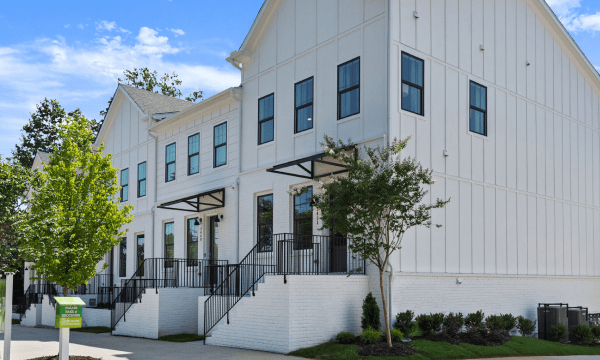

Riverline is an eclectic, in-town neighborhood on the bustling Westside of Atlanta. As the Riverside community continues to undergo a spectacular transformation, these spacious townhomes give you a slice of nature inside the city, near West Midtown and in Buckhead school districts.
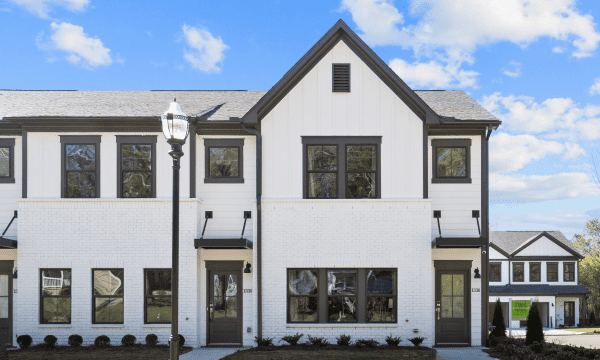

The Parc offers cozy Modern Prairie townhome design with a distinctive city lifestyle in East Atlanta. In a quiet retreat surrounded by nature, just minutes from vibrant East Atlanta Village, The Parc is one-of-a-kind city living at its best.
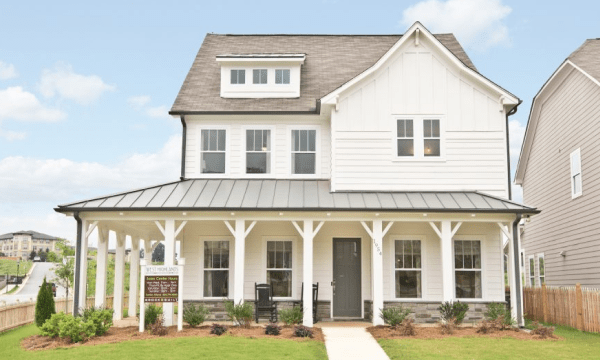

West Highlands is a sprawling community with a small town suburban vibe right in the center of desirable West Midtown. With both townhomes and single family homes, plus on-site amenities like a swimming pool and playground, you get the best of both city and suburban lifestyles in this neighborhood.
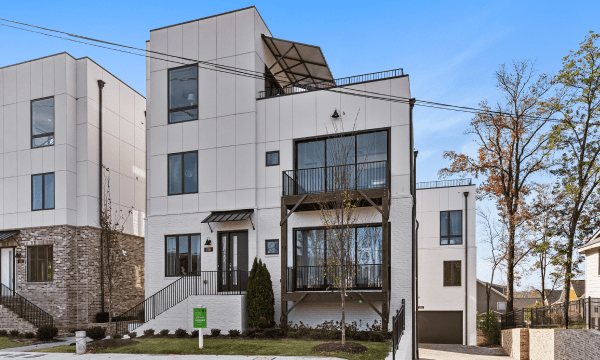

West Town’s vibrant single family design is right at home on the Westside. Residents enjoy living near Westside Provisions and having the opportunity to explore all of Atlanta via the heavily anticipated BeltLine trail extension which will run through the community.
Suburb Living
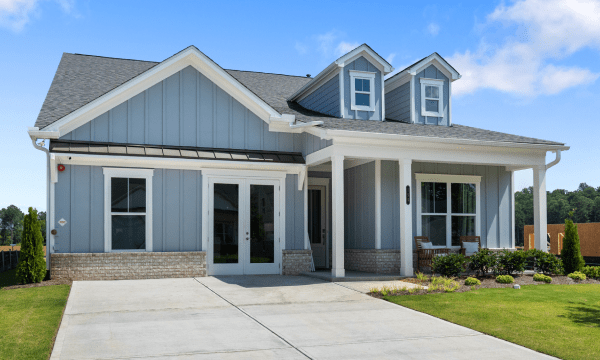

The Reserve at Bells Ferry is Brock Built’s active adult community located in the suburbs of East Cobb County, Georgia, near Downtown Woodstock. With spectacular amenities such as pickleball courts, a dog park, and outdoor entertaining spaces, plus floorplans with main floor living, The Reserve at Bells Ferry gives you all the advantages of suburban living near exciting shops, dining, and conveniences.
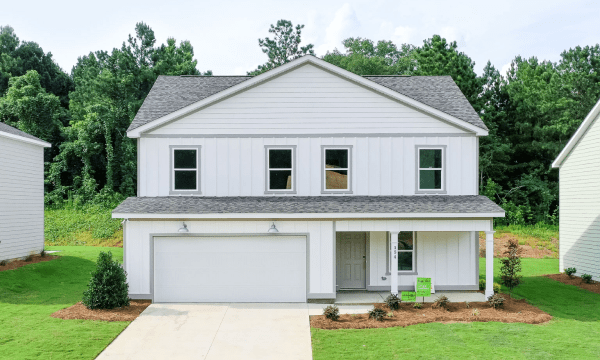

The Woods (Opelika, Alabama) is a quaint community of single family homes less than ½ mile from charming Main Street Opelika. Homes at The Woods are situated on large lots with spacious interiors built for entertaining and relaxing with friends and family.
No matter where you choose to live, investing in a new home is a special time for you, and Brock Built has communities to fit every lifestyle. See where Brock Built is building in the city and the suburbs all over Georgia, Florida, and Alabama. Contact our team to help you find the best neighborhood for your lifestyle!
